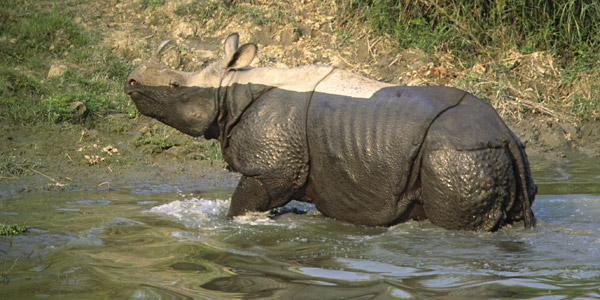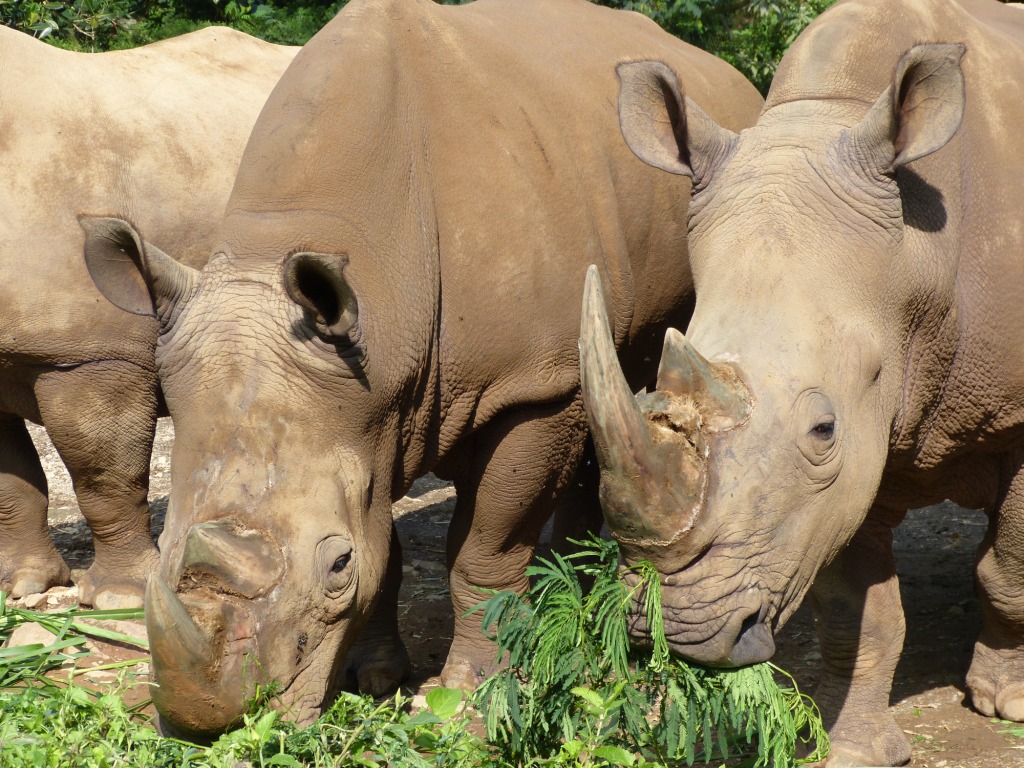CITES and Rhinos: Outcomes of CoP17

In heated discussions last week at the CITES Conference of the Parties (COP17) in Johannesburg, South Africa, the Parties (182 countries and the European Union), overwhelmingly rejected the proposal by Swaziland to “allow limited and regulated trade in white rhino horn collected from natural deaths, recovered from poached Swazi horn, and harvested from live white rhino in the future.” The proposal was defeated in a secret ballot with 100 parties rejecting the proposal, 26 in favor, and 17 countries abstaining (not all parties were present for the voting).
Mr. Ted Reilly of Swaziland passionately yet respectfully introduced the hotly-debated proposal by saying, “I feel like a rhino surrounded by poachers.” Mr. Reilly said that Swaziland submitted the proposal to CITES to be able to legally trade that country’s own rhino horn, with the hopes of finding a solution to the plight of rhinos. He said that the country is not interested in illegal trade, which does not benefit Swaziland and its people.
Swaziland, which has not lost a rhino to poaching since 2012, needs funds to meet the cost of protecting its rhino. Proceeds from the proposed horn trade could have been used to meet operational and protection needs for rhinos while benefiting a number of other species as well. Reilly noted that he was sad to see the polarization that has developed in recent years, noting that circumstances differ from country to country, and that solutions differ for differing circumstances.

A delegate from Kenya intervened, reminding the conference that rhino horn is simply keratin, the same material human hair and nails is made of, with no medicinal properties. They also suggested that the small quantities produced from Swaziland’s approximately 75 animals would not likely satisfy the market demand in Vietnam and China.
The Asian rhino range states of Bhutan, India, Indonesia, and Nepal stood united against the proposal, each stating that it was unclear what opening up international trade might do to their tiny populations of Greater one-horned, Sumatran, and Javan rhinos.
Indonesia’s Chief of Party noted, “In 2013, Asian rhino range States of Bhutan, India, Indonesia, Malaysia, and Nepal, met in Bandar Lampung, Indonesia. In the jointly agreed Bandar Lampung declaration, the Asian range States agreed that “The CITES ban in the international trade of all rhino products needs to be maintained and enforced, including by those countries where rhino products are used, any countries that act as intermediate points in the trade, and all rhino range States.”
Other African nations almost unanimously supported Swaziland’s proposal, most notably, Namibia and Zimbabwe, as well as South Africa, despite the fact that their Committee of Inquiry recommended against an international trade at this time. These four countries together hold 90% of Africa’s rhinos.
The Conference of the Parties supported the Draft Decisions and Amendment to the Resolution of the CoP15 on the Conservation of and Trade in African and Asian Rhinoceroses, which is the full list of decisions made at the COP.
The US also recommended that a mission be conducted to Vietnam to meet with enforcement and justice agencies to review arrests, prosecutions, and other processes in place for illegal possession of rhino horn, including at border points. The European Union followed with a similar recommendation for a mission to Mozambique to evaluate measures to combat trade in rhino horn and rhinoceros poaching. These two recommendations were included in the decision, as was the proposals to support the recommendations made in the African and Asian Rhinoceroses – Status, Conservation and Trade document, which Drs. Bibhab Talukdar and Susie Ellis from IRF and the Asian Rhino Specialist Group helped to compile.
Although the Convention itself does not provide for arbitration or dispute in the case of noncompliance, CITES has several ways to deal with infractions by a Party. When informed of an infraction, the Secretariat will notify all other Parties (in this year’s cases of Vietnam and Mozambique, all 182 Parties have already been informed). The CITES Secretariat will then give Vietnam and Mozambique time to respond to the allegations and may provide technical assistance to prevent further infractions.
Other actions may be taken against the offending Party, which include:
- A mandatory confirmation of all permits by the Secretariat;
- A suspension of cooperation from the Secretariat;
- A formal warning;
- A visit by the Secretariat, along with a team of pertinent experts, to verify capacity (also known as a “mission”);
- Recommendations that all Parties to suspend CITES related trade with the offending Party; and
- Dictation of corrective measures to be taken by the offending Party before the Secretariat will resume cooperation or recommend resumption of trade.
The reports from the missions to Vietnam and Mozambique will be evaluated at the next meeting of the CITES Standing Committee, which will convene in 2017. Failure to show progress and/or to meet the rules laid out by CITES may result in trade sanctions against both countries for noncompliance with the treaty. These sanctions act as deterrents to noncompliance because they limit economic trade and growth.
In the past, bilateral sanctions have been imposed using national legislation. One successful example of the use of these sanctions occurred in 1991, when the US used certification under its Pelly Amendment to get Japan to revoke its reservation to Hawksbill turtle products, thus reducing the volume of its exports. Infractions may include negligence with respect to permit issuing, excessive trade, lax enforcement, and failing to produce annual reports.
The IRF, with the Environmental Investigation Agency (EIA), filed a Pelly Amendment petition for sanctions against Mozambique in 2014. The EIA, following their publication of Vietnam’s Illegal Rhino Horn Trade: undermining the effectiveness of CITES, had filed a similar petition against Vietnam in 2012, with the International Fund for Animal Welfare (IFAW), and the Animal Welfare Institute. Both petitions have stalled, and have been sitting with the USFWS since their filing.
IRF is pleased with the decisions made for rhinos at COP17. The issue of rhino horn trade is not black and white – there are many issues to be taken strongly under consideration and many safeguards would need to be put in place before it could be implemented. For now, IRF believes that trade in rhino horn should not be legalized until there are convincing data indicating that legalization will enhance wild rhino conservation efforts. Please read our full statement on horn trade here.
We will continue to keep you posted on news related to rhinos and international trade as new developments arise.
Thank you, as ever, for your support and belief in IRF’s work.




One thought on “CITES and Rhinos: Outcomes of CoP17”